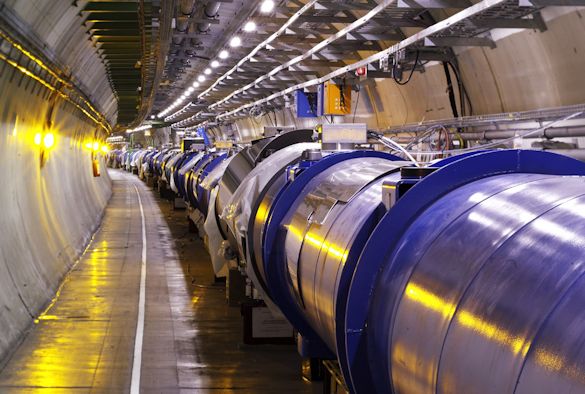
An eight-million-pound project as a UK contribution to an upgrade to the Large Hadron Collider (LHC) at CERN, led by researchers from the University and Cockcroft Institute, has been launched.
The High Luminosity –Large Hadron Collider-UK (HL-HLC-UK) project involves seven UK universities, and will deliver cutting-edge research and essential components as part of an international effort to upgrade the world’s highest energy particle accelerator over the next few years. This will enable scientists to look for new, very rare fundamental particles, and to measure known particles like the Higgs boson with unprecedented accuracy.
Luminosity
It will do this by enabling the machine to deliver more collisions per second, called luminosity. This is a key performance indicator of an accelerator, as it tells you the number of particles colliding in a certain amount of time.
Since discoveries in particle physics are based on collecting large amounts of data, the greater the number of collisions, the more chance physicists have of seeing a new particle, probing physics below the world’s best collider sensitivity.
The higher number of collisions also makes measurements of particle’s properties much more accurate, for example the properties of the Higgs Boson. This upgrade will ensure the LHC continues to push the limits of human knowledge, enabling physicists to explore beyond the Standard Model.
Challenging procedure
The HL-LHC-UK will help to increase the overall luminosity by a factor of 10, delivering 10 times more collisions than the LHC would do over the same period of time. This will produce 15 million Higgs bosons per year, compared to the 1.2 million in total created between 2011 and 2012. Upgrading the LHC will be a challenging procedure, and relies on several breakthrough technologies currently under development.
The Head of Liverpool’s Physics Department, Professor Carsten P. Welsch, who leads the Liverpool effort said: “I am absolutely thrilled that Liverpool can be part of this international study that aims at making the world’s highest energy accelerator even better.
“We will be making key contributions to this project through studies into beam stability and diagnostics. Amongst others, we will develop novel beam monitors to fully characterise the HLLHC beam. Currently no technique exists to do this with the required precision and reliability and this offers fascinating research prospects.”
HL-LHC-UK will perform cutting-edge research and development and deliver hardware to the LHC upgrade in four areas. These are proton beam collimation to remove stray halo protons, the development and test of transverse deflecting cavities (“crab cavities”), new methods to diagnose the stored beams and sophisticated cold powering technology needed for the cryogenic systems.
Professor Lucio Rossi, Head of the High-Luminosity LHC project, added: “We have to innovate in many fields, developing cutting-edge technologies for magnets, the optics of the accelerator, superconducting radiofrequency cavities, and superconducting links.” We are very excited for the UK to be making key contributions and using their expertise to help deliver this upgrade.”
The signature of the contract coincides with the 6th HL-LHC collaboration meeting which took place in Paris between 14-16 November. Joining almost 200 accelerator experts from around the world the meeting was ideal to discuss the current performance of the LHC and challenges related to the upgrade.
More information about the High Luminosity LHC project, its technology and design as well as the challenges ahead can be found in the recently released open access HiLumi LHC book “The High Luminosity Large Hadron Collider. The New Machine for Illuminating the Mysteries of the Universe”.